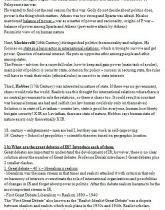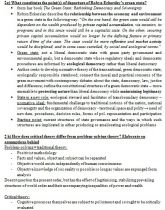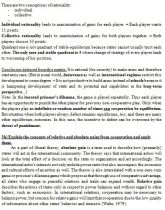Hledej
Zobraz:
Univerzity
Kategorie
Rozšířené vyhledávání
12 663
projektů
Theories in International Relationships
| Přípona .docx |
Typ studijní materiál |
Stažené 0 x |
| Velikost 0,1 MB |
Jazyk anglický |
ID projektu 9373 |
| Poslední úprava 09.01.2017 |
Zobrazeno 1 249 x |
Autor: clean.bandit |
 Sdílej na Facebooku
Sdílej na Facebooku |
||
| Detaily projektu | ||
- Cena:
6 Kreditů - kvalita:
90,6% -
Stáhni
- Přidej na srovnání
- Univerzita:Univerzita Karlova v Praze
- Fakulta:Fakulta sociálních věd
- Kategorie:Humanitní vědy » Politologie
- Předmět:Mezinárodní vztahy
- Studijní obor:-
- Ročník:3. ročník
- Formát:MS Office Word (.docx)
- Rozsah A4:27 stran
SECTION 1
1.a) realists thoughts until great debate
The realist thoughts begun with Thucydides (5th century BC) and his work History of Peloponessian war.
He wanted to find out the real reason for this war. Gods do not decide about politics does, power is the thing which matters. Athens was too strong and Sparta was afraid. He also mentioned balance of power - war as a matter of power and racionality, origins of P.war - balance of power among Sparta and Athens (preventive attack by Athens)
Pesimistic view of on human nature
Next, Machiavelli (16th Century) distinguished politics from morality and religion. He focuses on state as a basic actor in international relations, which is trying to survive and get power. Question of national interest. He puts as opposites ethic among people and ethic among states.
The Prince - advices for a sucesfull ruler, how to keep and gain power (main task of a ruler), main point of politics is security state, criterion for policy - success in securing state, the ruler will have to weak their rules (ethnical rules) in case it is in state interests
Third, Hobbes (17th Century) was interested in nature of state. If there was no government, chaos would rule the world. Realists use this thought for international relations where there is no central government to rule the relations, so there is chaos too. It could result in constant war because human are bad and selfish (no law human could rely only on themselves)
Solution is in state of Leviathan - creates law, state is good for everyone, human lose liberty but gain security! X IR no Leviathan, there are state of nature, Hobbes says human state of nature exists only theoretically X IR
1.a) realists thoughts until great debate
The realist thoughts begun with Thucydides (5th century BC) and his work History of Peloponessian war.
He wanted to find out the real reason for this war. Gods do not decide about politics does, power is the thing which matters. Athens was too strong and Sparta was afraid. He also mentioned balance of power - war as a matter of power and racionality, origins of P.war - balance of power among Sparta and Athens (preventive attack by Athens)
Pesimistic view of on human nature
Next, Machiavelli (16th Century) distinguished politics from morality and religion. He focuses on state as a basic actor in international relations, which is trying to survive and get power. Question of national interest. He puts as opposites ethic among people and ethic among states.
The Prince - advices for a sucesfull ruler, how to keep and gain power (main task of a ruler), main point of politics is security state, criterion for policy - success in securing state, the ruler will have to weak their rules (ethnical rules) in case it is in state interests
Third, Hobbes (17th Century) was interested in nature of state. If there was no government, chaos would rule the world. Realists use this thought for international relations where there is no central government to rule the relations, so there is chaos too. It could result in constant war because human are bad and selfish (no law human could rely only on themselves)
Solution is in state of Leviathan - creates law, state is good for everyone, human lose liberty but gain security! X IR no Leviathan, there are state of nature, Hobbes says human state of nature exists only theoretically X IR
Klíčová slova:
international relations
classical realism
balance
power
national identity
co-operation
Obsah:
- Section 1
1 a) Outline the evolution of the realist thought until the first great debate.
1 b) What are the great debates of IR? Introduce each of them.
1 c) Explain the evolution of the liberal thought in the 20th century.
1 d) Classify the main post‐positivist (or reflectivist) approaches and explain how they differ from one another.
1 e) What do classical realism and neorealism have in common? Where do they differ?
1 f) What is IR constructivism (intellectual roots, main ideas) and who are its main representatives?
1 g) Classify the main post‐positivist (or reflectivist) approaches and explain how they differ from one another.
1 h) When, (where), how had the Marxist thought entered the field of IR?
1 i) Classify the main streams in feminist thought in IR, explain their roots, differences in ontologies and epistemologies.
1 j) Try to “localize” the environmental agenda within the IR thought/discourse (time, context, approaches).
Section 2
2 a) Explain the concept of balance of power.
2 b) What is the democratic peace thesis about?
2 c) How does Kenneth Waltz define the international structure?
2 d) How does Alexander Wendt analyze the international system?
2 e) What is the agency‐structure debate about? Why is it important for IR?
2 f) Explain the concept of the international regime.
2 g) What constitutes the point(s) of departure of Robyn Eckersley’s green state?
2 h) How does critical theory differ from problem‐solving theory? Elaborate on assumptions behind.
2 i) Theory of moves - how does it differ from standard non‐cooperative game theoretical models?
2 j) Explain the normative dimensions of the feminist theory in IR.
Section 3
3 a) How can foreign policy shape the national identity? Discuss it with respect to David Campbell‘s analysis of the US condition.
3 b) How can interdependence prevent conflicts? Refer to some examples.
3 c) Why does ontology matter in IR? Use examples.
3 d) Can international co‐operation continue if the hegemon who brought it about disappears? Use examples.
3 e) Explain the concepts of relative and absolute gains from co‐operation and apply them.
3 f) Analyze the possible political processes facilitating the transition from the Lockean culture of anarchy to the Kantian culture of anarchy.
3 g) Prisoner’s dilemma game: provide the matrix and offer an example of application.
3 h) Explain the concepts of relative and absolute gains from co‐operation and apply them.
3 i) The personal is international and the international is personal. Try to recall examples from Cynthia Enloe’s texts which could illustrate this statement.
3 j) Why are green IR theorists critical of sustainable development theory?


